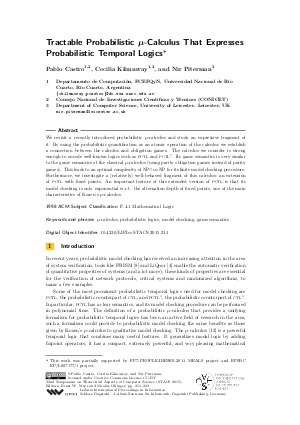Tractable Probabilistic mu-Calculus That Expresses Probabilistic Temporal Logics
Authors Pablo Castro, Cecilia Kilmurray, Nir Piterman
-
Part of:
Volume:
32nd International Symposium on Theoretical Aspects of Computer Science (STACS 2015)
Part of: Series: Leibniz International Proceedings in Informatics (LIPIcs)
Part of: Conference: Symposium on Theoretical Aspects of Computer Science (STACS) - License:
 Creative Commons Attribution 3.0 Unported license
Creative Commons Attribution 3.0 Unported license
- Publication Date: 2015-02-26
File

PDF
LIPIcs.STACS.2015.211.pdf
- Filesize: 0.67 MB
- 13 pages
Document Identifiers
Subject Classification
Keywords
- mu-calculus
- probabilistic logics
- model checking
- game semantics
Metrics
- Access Statistics
-
Total Accesses (updated on a weekly basis)
0PDF Downloads0Metadata Views
Abstract
We revisit a recently introduced probabilistic \mu-calculus and study an expressive fragment of it. By using the probabilistic quantification as an atomic operation of the calculus we establish a connection between the calculus and obligation games. The calculus we consider is strong enough to encode well-known logics such as pctl and pctl^*. Its game semantics is very similar to the game semantics of the classical mu-calculus (using parity obligation games instead of parity games). This leads to an optimal complexity of NP\cap co-NP for its finite model checking procedure. Furthermore, we investigate a (relatively) well-behaved fragment of this calculus: an extension of pctl with fixed points. An important feature of this extended version of pctl is that its model checking is only exponential w.r.t. the alternation depth of fixed points, one of the main characteristics of Kozen's mu-calculus.
Cite As Get BibTex
Pablo Castro, Cecilia Kilmurray, and Nir Piterman. Tractable Probabilistic mu-Calculus That Expresses Probabilistic Temporal Logics. In 32nd International Symposium on Theoretical Aspects of Computer Science (STACS 2015). Leibniz International Proceedings in Informatics (LIPIcs), Volume 30, pp. 211-223, Schloss Dagstuhl – Leibniz-Zentrum für Informatik (2015)
https://doi.org/10.4230/LIPIcs.STACS.2015.211
BibTex
@InProceedings{castro_et_al:LIPIcs.STACS.2015.211,
author = {Castro, Pablo and Kilmurray, Cecilia and Piterman, Nir},
title = {{Tractable Probabilistic mu-Calculus That Expresses Probabilistic Temporal Logics}},
booktitle = {32nd International Symposium on Theoretical Aspects of Computer Science (STACS 2015)},
pages = {211--223},
series = {Leibniz International Proceedings in Informatics (LIPIcs)},
ISBN = {978-3-939897-78-1},
ISSN = {1868-8969},
year = {2015},
volume = {30},
editor = {Mayr, Ernst W. and Ollinger, Nicolas},
publisher = {Schloss Dagstuhl -- Leibniz-Zentrum f{\"u}r Informatik},
address = {Dagstuhl, Germany},
URL = {https://drops.dagstuhl.de/entities/document/10.4230/LIPIcs.STACS.2015.211},
URN = {urn:nbn:de:0030-drops-49155},
doi = {10.4230/LIPIcs.STACS.2015.211},
annote = {Keywords: mu-calculus, probabilistic logics, model checking, game semantics}
}
Author Details
References
-
C. Baier and J.-P. Katoen. Principles of Model Checking. MIT Press, 2008.

-
A. Bianco and L. de Alfaro. Model checking of probabalistic and nondeterministic systems. In 15th Conference on Foundations of Software Technology and Theoretical Computer Science, volume 1026 of Lecture Notes in Computer Science, pages 499-513. Springer, 1995.

-
K. Chatterjee and N. Piterman. Obligation blackwell games and p-automata. Technical report, arXiv:1206.5174, 2012.

-
F. Ciesinski and C. Baier. LiQuor: A tool for qualitative and quantitative linear time analysis of reactive systems. In QEST, pages 131-132. IEEE Computer Society, 2006.

-
R. Cleaveland, S. Purushothaman Iyer, and M. Narasimha. Probabilistic temporal logics via the modal mu-calculus. Theor. Comput. Sci., 342(2-3):316-350, 2005.

-
A. Condon. The complexity of stochastic games. Inf. Comput., 96(2):203-224, 1992.

-
E.A. Emerson and C. Lei. Efficient model checking in fragments of the μ-calculus. In LICS. IEEE Computer Society, 1986.

-
A. Hinton, M.Z. Kwiatkowska, G. Norman, and D. Parker. PRISM: a tool for automatic verification of probabilistic systems. In TACAS, volume 3920 of Lecture Notes in Computer Science. Springer-Verlag, 2006.

-
M. Huth and M.Z. Kwiatkowska. Quantitative analysis and model checking. In 12th IEEE Symposium on Logic in Computer Science, pages 111-122. IEEE Computer Society, 1997.

-
M. Huth, N. Piterman, and D. Wagner. p-automata: New foundations for discrete-time probabilistic verification. Performance Evaluation, 69(7-8):356-378, 2012.

-
M. Jurdzinski. Deciding the winner in parity games is in UP ∩ co-UP. Inf. Process. Lett., 68(3):119-124, 1998.

-
D. Kozen. Results on the propositional μ-calculus. In Automata, Languages and Programming, volume 140 of Lecture Notes in Computer Science. Springer Berlin Heidelberg, 1982.

-
A. McIver and C. Morgan. Results on the quantitative μ-calculus qMμ. ACM Trans. Comput. Log., 8(1), 2007.

-
M. Mio. Game Semantics for Probabilistic μ-Calculi. PhD thesis, University of Edinburgh, 2012.

-
M. Mio and A. Simpson. Łukasiewicz μ-calculus. In FICS, 2013.

-
K. Scheider. Verification of Reactive Systems: Formal Methods and Algorithms. Springer, 2004.

-
U. Zwick and M. Paterson. The complexity of mean payoff games on graphs. Theor. Comput. Sci., 158(1&2):343-359, 1996.

